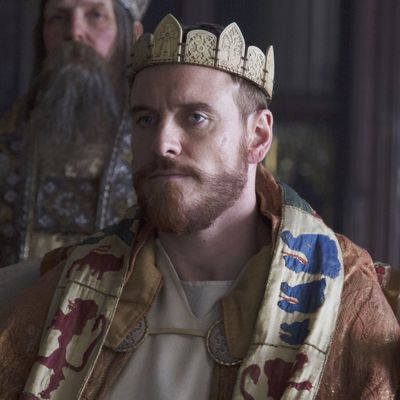
If you’ve ever wanted to know how Shakespearean tragedy would play in a minor, more intimate key — no declaiming, no vaulting theatricality — then screw your caffeine to the sticking place and see Macbeth with Michael Fassbender and Marion Cotillard.
Filmed in shades of black, dark brown, charcoal, and ash, with the occasional orange flame for (minimal) illumination, the story opens with three witches who are less animated than people waiting for a bus and a brand-new scene in which the devastated Macbeths bury their dead child — presumably to explain why Lady M. is such a meanie at first but later gets the sads when her husband murders some kids in front of her eyes.
Macbeth personally setting fire to Macduff’s wife and children is only one of many narrative innovations. Another is having Duncan’s son, Malcolm (Jack Reynor), in the bedroom when Macbeth hacks up King Duncan (David Thewlis). True, Duncan’s kingly pronouncements had been made in near-whispers, so perhaps Malcolm had stopped in late to confirm that his father had, in fact, made him next in line for the throne. Later on, Cotillard’s mad sleepwalking scene is notable for the fact that she’s neither mad (she’s praying before a giant cross) nor asleep. Perhaps it’s a dream — it’s hard to tell when all the characters are so narcotized. Cotilliard is a great actress, but her verse speaking has no drive.
Much of the text is cut to make way for huge pauses between words. (“Tomorrow …” [one one thousand, two one thousand, three one thousand, four one thousand, five one thousand] “and tomorrow …” [one one thousand, two one thousand, three one thousand, four one thousand, five one thousand] and tomorrow …” Talk about creeping in this petty pace! Fassbender becomes smaller and more inward as the film goes on until he’s staring in the face of Macduff (Sean Harris) on the battlefield and doesn’t … want … to … say … his … lines, leaning on his bloodied foe like a punch-drunk werewolf.
Is Fassbender yet another victim of the Macbeth curse — which, even as an avowed skeptic in other areas, I will always maintain is real? Note the play’s irregular meter: It’s as if Shakespeare wove the evil into the lines. I’ve seen several actors, among them Albert Finney at the National, give up midway through the performance, although Patrick Stewart on Broadway managed to keep his energy — if not his inspiration — from flagging. I know of one very prominent actor who disappeared from rehearsals of a major rep company and was found several days later and two thousand miles away banging his head against a barbed-wire fence. Fassbender is, in any case, the right Macbeth for the film that’s little more than a chamber-music dirge, but his dullness made me wonder if he’s really all that.
In the Scottish play-movie sweepstakes, this one — directed by Justin Kurzel — is well back of the gory post-Manson version by Roman Polanski (in collaboration with Kenneth Tynan) and the flawed but often thrilling Orson Welles film, which the Big Man himself correctly called a “bold charcoal sketch” of the play. Even though it’s in Japanese, Kurosawa’s mesmerizing Throne of Blood is truer to the spirit of the play. (The best production I’ve seen saw was a Kabuki-style enactment by an amateur company in some closet Edinburgh performance space.) I can’t decide if Kurzel’s Macbeth is worse than the geriatric Maurice Evans–Judith Anderson version I was forced to endure in high school, but it’s certainly less lively than the two terrible gangster updates, Joe Macbeth and Men of Respect. Pity the schoolkids who’ll be sentenced to watch it by the sort of well-meaning teachers who think Baz Luhrmann’s poetry-killing Romeo + Juliet with Leo and Claire will make them see Shakespeare in a new light. This Macbeth is so dim that they’ll barely be able to see it at all.


